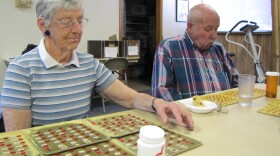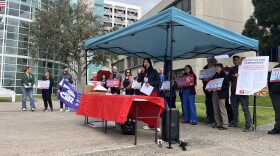At 65, Ann Smith’s hearing started to wane. She was a fourth grade teacher at All Saints Episcopal Day School in Phoenix and found she kept having to ask the students, over and over again, to repeat themselves. It was, she said to herself, time to retire.
“So I went to the head of school and told him I wanted to retire,” Smith remembers. “And he said good, because he’d been talking about creating the job of Director of Alumni for me because I’d been here so long and knew so many people.”
Somehow, both Smith and her boss knew that when Smith said: “I want to retire,” she really meant: “I want another job.”
“I knew that I couldn’t just play golf,” Smith said, laughing. “I don’t know how to play golf. I don’t want to learn. I’d rather do what I can do - I feel like I’m providing a real service to the school.”
Researchers point to a whole host of reasons why: Economic necessity, longer life spans, social security changes that incentivize working longer, and, what Smith alluded to: the desire to feel useful and helpful to the very end.
All around the country, programs are springing up to help older Americans find their next calling. Divinity schools are enrolling seniors in droves. Troops to Teachers helps retired vets become educators. And in Phoenix, a program called Experience Matters, matches skilled, qualified older adults with non-profits who need them.
Many of these adults aren’t waiting until they’re at the so-called retirement age of 65 to make the change. Linda Mason, who is with the Experience Matters, left the corporate world in her 50s.
“The word retirement - I’m not even sure I know what that word means anymore, and I don’t mean that facetiously,” Mason said. “But, my generation isn’t going to sit in the Barcalounger and watch T.V. We’re different, we’ve got all these skills.”
Mason got her first, early ideas of retirement from her parents, who were basically given two options, essentially the 20th century’s retirement ideals. One was to idle away, rocking endlessly on a porch somewhere. The other was to stage a second childhood and play golf and shuffleboard for 30 years.
“But it was looked at as they earned it, they worked hard all their life, they had earned retirement. So their visions were now I don’t have to do that anymore,” Mason said. “My generation’s vision is: ‘Oh my gosh, I can’t imagine not doing that anymore!’ Maybe not in the public sector. Maybe not for a corporation. But the concept of just sitting is just not one that we’re comfortable with.”
In lieu of both the rocking chair and golf, Marc Freedman, who runs the San Francisco-based Civic Ventures, said the goal, in tagline form, is: “Passion, purpose, and a paycheck.”
Freedman said these people are essentially redefining maturity with what he calls “Encore Careers.” This is certainly true in Smith’s case. If she were to ever leave All Saints, Smith can only think about what other jobs she might do.
“I’m an English teacher. So I could help at another school or come here - as a volunteer in the classroom,” she said. “I can’t think of anything worse than not having something to do to help other people, I guess that’s it. I just like doing things for people.”
At some point, Smith knows she will have to stop working and enter a "true retirement". But what that looks like, no one really knows.







